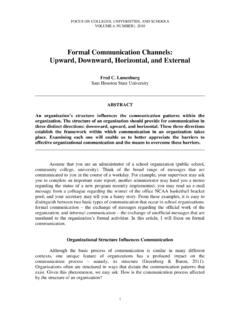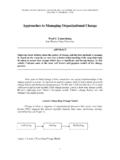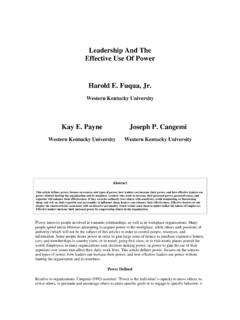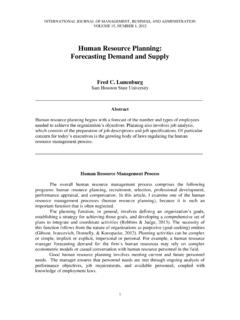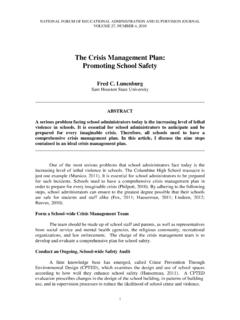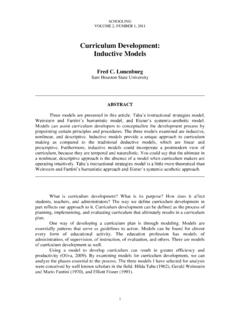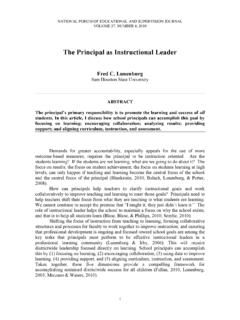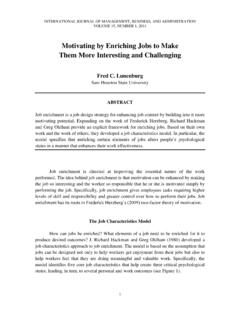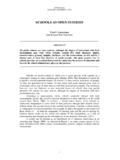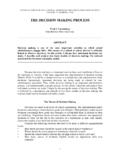Transcription of Self-Efficacy in the Workplace: Implications for ...
1 INTERNATIONAL JOURNAL OF MANAGEMENT, BUSINESS, AND ADMINISTRATION VOLUME 14, NUMBER 1, 2011 1 Self-Efficacy in the Workplace: Implications for Motivation and Performance Fred C. Lunenburg Sam Houston State University _____ ABSTRACT Self-Efficacy (beliefs about one s ability to accomplish specific tasks) influences the tasks employees choose to learn and the goals they set for themselves. Self-Efficacy also affects employees level of effort and persistence when learning difficult tasks. Four sources of Self-Efficacy are past performance, vicarious experience, verbal persuasion, and emotional cues. _____ Mainly due to the work of Albert Bandura, Self-Efficacy has a widely acclaimed theoretical foundation (Bandura, 1986), an extensive knowledge base (Bandura, 1997; Maddux, 1995, 2002), and a proven record of application in the workplace (Bandura, 1997, 2004; Stajkovic & Luthans, 1998).
2 Nine large-scale meta-analyses consistently demonstrate that the efficacy beliefs of organization members contribute significantly to their level of motivation and performance (Bandura & Locke, 2003). Self-Efficacy Defined Self-Efficacy (also known as social cognitive theory or social learning theory) is a person s belief that she is capable of performing a particular task successfully (Bandura, 1977, 1997). Think of Self-Efficacy as a kind of self-confidence (Kanter, 2006) or a task-specific version of self-esteem (Brockner, 1988). Self-Efficacy has three dimensions: magnitude, the level of task difficulty a person believes she can attain; strength, the conviction regarding magnitude as strong or weak; and generality, the degree to which the expectation is generalized across situations.
3 An employee s sense of capability influences his perception, motivation, and performance (Bandura, 1997). We rarely attempt to perform a task when we expect to be unsuccessful. Following is an example. One professor may believe that she can learn how to teach graduate courses online on her own. Another professor may have strong doubts about his ability to learn how to teach graduate courses online without taking some formal training. Self-Efficacy has powerful effects on learning, motivation, and performance, because people try to learn and perform only those tasks that they believe INTERNATIONAL JOURNAL OF MANAGEMENT, BUSINESS, AND ADMINISTRATION 2_____ they will be able to perform successfully.
4 Self-Efficacy affects learning and performance in three ways (Bandura, 1982): 1. Self-Efficacy influences the goals that employees choose for themselves. Employees with low levels of Self-Efficacy tend to set relatively low goals for themselves. Conversely, an individual with high Self-Efficacy is likely to set high personal goals. Research indicates that people not only learn but also perform at levels consistent with their Self-Efficacy beliefs. 2. Self-Efficacy influences learning as well as the effort that people exert on the job. Employees with high Self-Efficacy generally work hard to learn how to perform new tasks, because they are confident that their efforts will be successful.
5 Employees with low Self-Efficacy may exert less effort when learning and performing complex tasks, because they are not sure the effort will lead to success. 3. Self-Efficacy influences the persistence with which people attempt new and difficult tasks. Employees with high Self-Efficacy are confident that they can learn and perform a specific task. Thus, they are likely to persist in their efforts even when problems surface. Conversely, employees with low Self-Efficacy who believe they are incapable of learning and performing a difficult task are likely to give up when problems surface. In an extensive literature review on Self-Efficacy , Albert Bandura and Edwin Locke (2003) concluded that Self-Efficacy is a powerful determinant of job performance.
6 Sources of Self-Efficacy Since Self-Efficacy can have powerful effects on organizations, it is important to identify its origin. Bandura (1997) has identified four principal sources of Self-Efficacy : past performance, vicarious experience, verbal persuasion, and emotional cues. These four sources of Self-Efficacy are shown in Figure 1. Figure 1. Sources of Self-Efficacy . Past Performance Vicarious Experience Verbal Persuasion Emotional Cues Self-Efficacy FRED C. LUNENBURG _____3 Past Performance According to Bandura, the most important source of Self-Efficacy is past performance.
7 Employees who have succeeded on job-related tasks are likely to have more confidence to complete similar tasks in the future (high Self-Efficacy ) than employees who have been unsuccessful (low Self-Efficacy ). Managers or supervisors can boost Self-Efficacy through careful hiring, providing challenging assignments, professional development and coaching, goal setting, supportive leadership, and rewards for improvement. Vicarious Experience A second source of Self-Efficacy is through vicarious experience. Seeing a co-worker succeed at a particular task may boost your Self-Efficacy .
8 For example, if your co-worker loses weight, this may increase your confidence that you can lose weight as well. Vicarious experience is most effective when you see yourself as similar to the person you are modeling. Watching LeBron James dunk a basketball might not increase your confidence in being able to dunk the basketball yourself if you are 5 feet, 6 inches tall. But if you observe a basketball player with physical characteristics similar to yourself, it can be persuasive. Verbal Persuasion The third source of Self-Efficacy is through verbal persuasion. Essentially this involves convincing people that they have the ability to succeed at a particular task.
9 The best way for a leader to use verbal persuasion is through the Pygmalion effect. The Pygmalion effect is a form of a self-fulfilling prophesy in which believing something to be true can make it true. Rosenthal and Jacobson s (1968) classic study is a good example of the Pygmalion effect. Teachers were told by their supervisor that one group of students had very high IQ scores (when in fact they had average to low IQ scores), and the same teacher was told that another group of students had low IQ scores (when in fact they had high IQ scores). Consistent with the Pygmalion effect, the teachers spent more time with the students they thought were smart, gave them more challenging assignments, and expected more of them all of which led to higher student Self-Efficacy and better student grades.
10 A more recent experiment conducted by Harvard researchers in a ghetto community produced similar results (Rist, 2000). The Pygmalion effect also has been used in the workplace. Research has indicated that when managers are confident that their subordinates can successfully perform a task, the subordinates perform at a higher level. However, the power of the persuasion would be contingent on the leader s credibility, previous relationship with the employees, and the leader s influence in the organization (Eden, 2003). INTERNATIONAL JOURNAL OF MANAGEMENT, BUSINESS, AND ADMINISTRATION 4_____ Emotional Cues Finally, Bandura argues that emotional cues dictate Self-Efficacy .
